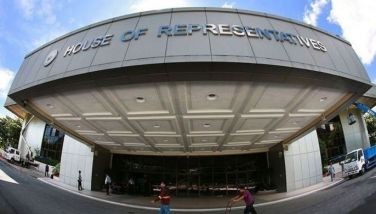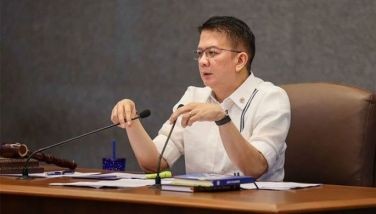CIA, FBI, Aussie agents operating in south — AFP
January 20, 2007 | 12:00am
DAVAO CITY — Several American and Australian intelligence agents are in Mindanao to monitor terrorist activities, military sources here claimed yesterday.
"Mindanao is crawling with CIA (Central Intelligence Agency), FBI (Federal Bureau of Investigation) and even Australian federal agents," a source told The STAR.
The source, who asked not to be named, said aside from the US Special Forces deployed in Zamboanga and assisting in Sulu, foreign intelligence agents are also helping track down Abu Sayyaf and Jemaah Islamiyah militants. The foreign agents pose as tourists, businessmen, consultants or even treasure hunters.
Meanwhile, in Washington, the director of the CIA praised the Philippines on Thursday for its fight against terrorists, saying the country’s government and military have worked closely with the United States to decrease the threat from extremists.
The American and Australian agents in Mindanao were the alleged source of the intelligence reports that were reportedly the basis of the travel advisories issued by their respective governments prohibiting their citizens from traveling to certain parts of the island because of terrorist threats.
"The perception that some parts of Mindanao have become breeding grounds of the terrorists has brought these (foreign) agents to the island," the source said.
Lt. Gen. Eugenio Cedo, Armed Forces Western Mindanao Command (Wesmincom) chief, confirmed that at least two FBI agents are now working in the area.
Cedo, who is based in Zamboanga City, arrived here Thursday for a meeting with officials of the Eastern Mindanao Command (Easmincom) regarding the joint operations against the Abu Sayyaf.
"They were the two (FBI agents) who paid me a courtesy call. But as to the others, they have not coordinated with my office, so I do not know about them and their movements if indeed they’re here," Cedo said.
He explained that the two FBI agents would only come in whenever an Abu Sayyaf member or a suspected terrorist is killed.
FBI agents were recently sent to Sulu to get DNA samples from a corpse believed to be that of Abu Sayyaf chieftain Khadaffy Janjalani.
Abu Sayyaf rebels who have turned themselves in led government troops to the location where Janjalani was buried, after the Abu Sayyaf leader was allegedly killed during an encounter with government troops last year in Patikul, Sulu.
Army special forces also killed Abu Sayyaf spokesman Jainal Antel Sali Jr., alias Abu Solaiman, during a firefight in Talipao, Sulu last Tuesday.
The US Embassy in Manila remained mum over reports on the presence of FBI and CIA agents in Mindanao.
Press Attaché Matthew Lussenhop declined yesterday to confirm the reported arrival of FBI and CIA agents with their Australian counterparts in Mindanao for assessment of the government’s campaign against terrorism.
"No. I couldn’t confirm that," Lussenhop said in a telephone interview.
He added that US servicemen are in Mindanao taking part in development projects of the US Agency for International Development (USAID).
The US was one of the foreign governments that issued travel advisories warning of terror attacks prior to the postponement of the 12th Association of Southeast Asian Nations (ASEAN) Summit in Cebu in December last year.
The Australian Embassy in Manila also issued a travel advisory last Jan. 10 that identified nine areas in Mindanao as likely targets of bombings.
Australian Minister for Trade Warren Truss said that the travel advisory issued by the embassy following the recent bombings in Mindanao was his government’s obligation to its citizens.
Truss, who participated in the ASEAN Summit in Cebu last week, added that Australia has been helping and supporting the Philippines’ campaign against terrorism.
Australia cited credible reports that terrorists are planning attacks against a range of targets, including places frequented by foreigners.
The Australian government is currently negotiating a Status of Forces Agreement (SOFA) with the Philippines and hopes to finalize it soon and have the defense accord ratified by the Philippine Senate before the May elections.
Philippines-ASEAN National Organizing Committee chairman Marciano Paynor Jr. said that the bombings in General Santos, Cotabato and Kidapawan cities were isolated from the ASEAN Summit venue in Cebu.
Paynor said the venues for the Cebu Summit were all safe and secure and the leaders arrived as scheduled.
The government condemned the bombings, saying they were an act of terrorism that the ASEAN leaders would be addressing in Cebu.
The leaders adopted the historic ASEAN Convention on Counter Terrorism, a crucial tool in the region’s collective war against terror.
Cedo said the FBI agents in Mindanao are investigating the reported killings of Abu Sayyaf bandits.
"They (FBI) investigate also," Cedo said.
The CIA, FBI and Australian agents also reportedly conduct their own investigations when bombings and similar attacks occur in the South.
CIA Director Michael Hayden told lawmakers that the US-Philippines cooperation has contributed greatly to strengthening the capacity of the Philippine Armed Forces and the security services.
"In terms of what intelligence and military power can do, it’s done in this part of the global war against terror," Hayden said at the House of Representatives Intelligence Committee hearing.
Rep. Todd Tiahrt said the US has "trained the Philippine military, and we’ve given them tools necessary to make that country safer and this is a success story."
Lt. Gen. Rodolfo Obaniana, Easmincom chief, said he does not know of any CIA, FBI or Australian agent working in his area of responsibility.
Mayor Rodrigo Duterte said Australian federal agents have coordinated with him.
Duterte, who is President Arroyo’s presidential adviser on peace and order and security issues, said he also received field reports regarding the presence of CIA and FBI agents in Davao City. "They did not get in touch with me," he said.
Sources said sometimes the presence of foreign agents creates conflicts with the job of local intelligence agents.
"The problem is there are times that these agents tend to overshoot their mandate and meddle in our jobs in our very own territory and those are times that we make it clear to them that they have to stop at certain points. We have to draw the line," the source said.
The source said some of the foreign agents are braggarts who look down on their local counterparts.
"Whether we like it or not, it is clear that the Americans are here in Mindanao to protect their interest and their interest alone," the same source said.
But Cedo welcomed the presence of the American troops in Sulu since the US forces have made the operations against the Abu Sayyaf group easier.
"The Americans have helped a lot not only in supporting us in the combat operations but also in the medical and civic work in Sulu," Cedo said.
He said life in Sulu is now a lot better than before the Americans arrived.
"It is a two-pronged approach, while there is combat operation against the Abu Sayyaf, the American and the Filipino forces have also jointly undertaken civic and medical missions that helped the lives of those in Sulu," Cedo said.
He explained that the Americans have not only constructed school buildings and roads but they have also donated computers to the residents and installed local water system.
"Somehow, whatever it is, the AFP will benefit from the cooperation with the American forces as we shall soon have whatever is included in the release of the P10-billion military modernization package," Cedo said.
He described the joint operations with the American forces in Sulu as an "add-on" to the modernization program. - Pia Lee-Brago, AP
"Mindanao is crawling with CIA (Central Intelligence Agency), FBI (Federal Bureau of Investigation) and even Australian federal agents," a source told The STAR.
The source, who asked not to be named, said aside from the US Special Forces deployed in Zamboanga and assisting in Sulu, foreign intelligence agents are also helping track down Abu Sayyaf and Jemaah Islamiyah militants. The foreign agents pose as tourists, businessmen, consultants or even treasure hunters.
Meanwhile, in Washington, the director of the CIA praised the Philippines on Thursday for its fight against terrorists, saying the country’s government and military have worked closely with the United States to decrease the threat from extremists.
The American and Australian agents in Mindanao were the alleged source of the intelligence reports that were reportedly the basis of the travel advisories issued by their respective governments prohibiting their citizens from traveling to certain parts of the island because of terrorist threats.
"The perception that some parts of Mindanao have become breeding grounds of the terrorists has brought these (foreign) agents to the island," the source said.
Lt. Gen. Eugenio Cedo, Armed Forces Western Mindanao Command (Wesmincom) chief, confirmed that at least two FBI agents are now working in the area.
Cedo, who is based in Zamboanga City, arrived here Thursday for a meeting with officials of the Eastern Mindanao Command (Easmincom) regarding the joint operations against the Abu Sayyaf.
"They were the two (FBI agents) who paid me a courtesy call. But as to the others, they have not coordinated with my office, so I do not know about them and their movements if indeed they’re here," Cedo said.
He explained that the two FBI agents would only come in whenever an Abu Sayyaf member or a suspected terrorist is killed.
FBI agents were recently sent to Sulu to get DNA samples from a corpse believed to be that of Abu Sayyaf chieftain Khadaffy Janjalani.
Abu Sayyaf rebels who have turned themselves in led government troops to the location where Janjalani was buried, after the Abu Sayyaf leader was allegedly killed during an encounter with government troops last year in Patikul, Sulu.
Army special forces also killed Abu Sayyaf spokesman Jainal Antel Sali Jr., alias Abu Solaiman, during a firefight in Talipao, Sulu last Tuesday.
The US Embassy in Manila remained mum over reports on the presence of FBI and CIA agents in Mindanao.
Press Attaché Matthew Lussenhop declined yesterday to confirm the reported arrival of FBI and CIA agents with their Australian counterparts in Mindanao for assessment of the government’s campaign against terrorism.
"No. I couldn’t confirm that," Lussenhop said in a telephone interview.
He added that US servicemen are in Mindanao taking part in development projects of the US Agency for International Development (USAID).
The US was one of the foreign governments that issued travel advisories warning of terror attacks prior to the postponement of the 12th Association of Southeast Asian Nations (ASEAN) Summit in Cebu in December last year.
The Australian Embassy in Manila also issued a travel advisory last Jan. 10 that identified nine areas in Mindanao as likely targets of bombings.
Australian Minister for Trade Warren Truss said that the travel advisory issued by the embassy following the recent bombings in Mindanao was his government’s obligation to its citizens.
Truss, who participated in the ASEAN Summit in Cebu last week, added that Australia has been helping and supporting the Philippines’ campaign against terrorism.
Australia cited credible reports that terrorists are planning attacks against a range of targets, including places frequented by foreigners.
The Australian government is currently negotiating a Status of Forces Agreement (SOFA) with the Philippines and hopes to finalize it soon and have the defense accord ratified by the Philippine Senate before the May elections.
Philippines-ASEAN National Organizing Committee chairman Marciano Paynor Jr. said that the bombings in General Santos, Cotabato and Kidapawan cities were isolated from the ASEAN Summit venue in Cebu.
Paynor said the venues for the Cebu Summit were all safe and secure and the leaders arrived as scheduled.
The government condemned the bombings, saying they were an act of terrorism that the ASEAN leaders would be addressing in Cebu.
The leaders adopted the historic ASEAN Convention on Counter Terrorism, a crucial tool in the region’s collective war against terror.
Cedo said the FBI agents in Mindanao are investigating the reported killings of Abu Sayyaf bandits.
"They (FBI) investigate also," Cedo said.
The CIA, FBI and Australian agents also reportedly conduct their own investigations when bombings and similar attacks occur in the South.
"In terms of what intelligence and military power can do, it’s done in this part of the global war against terror," Hayden said at the House of Representatives Intelligence Committee hearing.
Rep. Todd Tiahrt said the US has "trained the Philippine military, and we’ve given them tools necessary to make that country safer and this is a success story."
Lt. Gen. Rodolfo Obaniana, Easmincom chief, said he does not know of any CIA, FBI or Australian agent working in his area of responsibility.
Mayor Rodrigo Duterte said Australian federal agents have coordinated with him.
Duterte, who is President Arroyo’s presidential adviser on peace and order and security issues, said he also received field reports regarding the presence of CIA and FBI agents in Davao City. "They did not get in touch with me," he said.
Sources said sometimes the presence of foreign agents creates conflicts with the job of local intelligence agents.
"The problem is there are times that these agents tend to overshoot their mandate and meddle in our jobs in our very own territory and those are times that we make it clear to them that they have to stop at certain points. We have to draw the line," the source said.
The source said some of the foreign agents are braggarts who look down on their local counterparts.
"Whether we like it or not, it is clear that the Americans are here in Mindanao to protect their interest and their interest alone," the same source said.
But Cedo welcomed the presence of the American troops in Sulu since the US forces have made the operations against the Abu Sayyaf group easier.
"The Americans have helped a lot not only in supporting us in the combat operations but also in the medical and civic work in Sulu," Cedo said.
He said life in Sulu is now a lot better than before the Americans arrived.
"It is a two-pronged approach, while there is combat operation against the Abu Sayyaf, the American and the Filipino forces have also jointly undertaken civic and medical missions that helped the lives of those in Sulu," Cedo said.
He explained that the Americans have not only constructed school buildings and roads but they have also donated computers to the residents and installed local water system.
"Somehow, whatever it is, the AFP will benefit from the cooperation with the American forces as we shall soon have whatever is included in the release of the P10-billion military modernization package," Cedo said.
He described the joint operations with the American forces in Sulu as an "add-on" to the modernization program. - Pia Lee-Brago, AP
BrandSpace Articles
<
>
- Latest
- Trending
Trending
Latest
Trending
Latest
Recommended
































